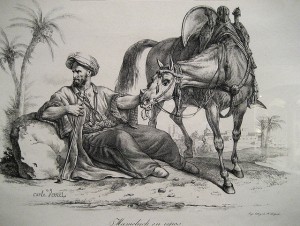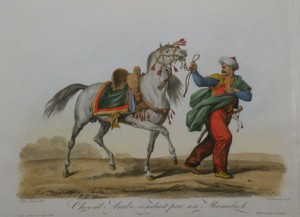Arabian Horse Intelligence
Today it’s nice to carry on yesterdays Arabian ‘horse intelligence’ blog with an excerpt from W.R.Brown, Horse of the Desert. (Asil Arabians II The Noble Arabian Horses- Olms Press)
Carle Vernet-Mamluk resting
“…Of the horses, the Arabian is the most intelligent, and has certain functions of the mind highly developed, such as memory, fortitude, and docility, that make him an extremely useful servant of man; and because he possesses the rudiments of many other mental functions, he is a most interesting companion.
Doctor William McDougall, one of the worlds foremost psychologists, now at Duke University, has been studying for some time the reactions of the so called horses with human brains, that from time to time appear to do remarkable tricks, to ascertain if beneath the evident mechanics of the training given there is not some slight form of hypnotism possible, from man to beast, that has not yet been apprehended.
It is certainly obvious that, even if the success of the tricks depend upon voice or gesture, the horse has far keener sensibilities than most people realize, and could be much more highly trained than is usually the case.
Carle Vernet – Oriental Et Son Cheval
The Arabs know this, and one is surprised in the desert to observe that no bits are used – the animal is controlled by a simple chain over the nose, attached to a halter. Pressure of the halter and legs, and the voice, are sufficient for guidance and control. A horse ridden by one man during their mutual lives comes to understand his master, much as a wife does her husband. The horse will start off at a gallop at a slight signal, canter if the weight is shifted back in the saddle, trot if pressure is put upon the neck, walk if the rider sits loosely and easily, and stop when his master throws up his hands and leans back; turn to the right or left, as the leg on that side is advanced or drawn back, and stand to attention while his master mounts or dismounts, without the halter rope being touched.” W. R. Brown, Horse of the Desert
In another excerpt by Kretschmar from the same book states. “In his memoirs the Syrian nobleman Usamah b. Munqid reports a hunting accident of his father’s. His father’s horse remained by his side and neighed until help came, and he thinks this accident is proof of faithfulness and intelligence, typical for the behaviour of the Arabian horse.”
Carle Vernet-Mamluk and Mount
This topic is close to my heart. After over thirty years of owning Arabian horses, breaking in our stallions myself, showing in many different disciplines, growing up foals and watching youngsters fulfil their potential, the Arabian horse’s intelligence and desire to be near you, continues to touch my heart. Our horse’s barn is barely thirty steps from the house. We truly love that they listen for your voice or call impatiently to be fed, to be let out in the morning or to come in at night. As a breed they are believable and real companions, quick to learn and never forget a lesson. Even if you’re like me and stretch out lessons by the months instead of days – even still they never forget! Their beauty is an added gift.



One Response
Judy Vanvossen
Email me everything ..just buying my first horse an Arabian filly